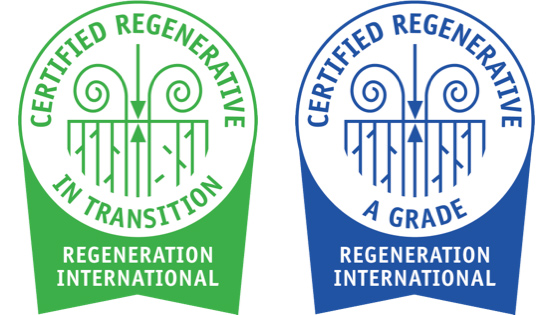Regeneration International launches certification standard

Published: June 17, 2025
Category: Regenerative Agriculture
In March, Regeneration International launched a standard for organic certifiers, clearly defining what is prohibited (therefore not permitted) in regenerative agriculture. It’s user-friendly for farmers and landholders, and offers two levels of certification: Regenerative A Grade (meeting all the requirements) and Regenerative in Transition (in the process of meeting all the requirements).
The nonprofit organization’s announcement said the “primary aim of the Regeneration International Standard is to catalyze a paradigm shift from the current degenerative industrial-agricultural systems to ones that restore soil, biodiversity, climate, community, equity, care, and health” and that they initiated the certification “to combat greenwashing and the hijacking of regenerative and organic practices.”
Regeneration International mentioned two drivers for publishing the standard:
California’s release of its definition of regenerative agriculture, which permits toxic synthetic chemicals and GMOs, and requests from farmers and certifiers for an international, standalone regenerative standard.
Aiming to be straightforward rather than lengthy and complex, the nonprofit set out to clearly list what is not allowed in regenerative agriculture.
Prohibitions include:
- Synthetic pesticides, animal feed supplements, and food additives
- Water-soluble chemical fertilizers (except for correcting deficiencies with trace elements)
- Sewerage sludge/biosolids
- GMOs, including gene editing and GMO vaccines
- Nanotechnology
- Animal cruelty
- Confined Animal Feeding Operations
- Hydroponics
- Clearing old growth and high-value ecosystems
- Damaging tillage
- Burning crop residues (except for cool-season mosaic burns in First Nation agroecosystems)
- Grazing that produces bare soil
“Most currently certified regenerative and organic systems would be classified as Regenerative in Transition,” the announcement explained, “as they permit prohibited inputs and practices. Certified operators need a transition plan that outlines the timeline for reducing and eliminating prohibited products or production methods.” While there’s no set time period for operators to transition to Regenerative A Grade, all Regenerative in Transition-certified operators are required to “specify time frames and methods for eliminating prohibited inputs and practices,” revise their plan annually, and keep the focus on continuous improvement.
The Regeneration International Standard will be regularly revised based on feedback, making it a living document, and will be rolled out to the 80 countries in which the nonprofit has partners.
Source: Regeneration International
To view source article, visit: https://regenerationinternational.org/2025/04/27/launching-certification-to-the-regeneration-international-standard/
Organic & Non-GMO Insights June 2025




